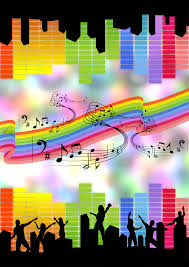This year, as it is every year, my class is a group of amazing and wonderful students. If you know me, or read this blog regularly, you know that I work in a congregated special education class with students who experience the world through the lens of Autism, Down's Syndrome, Global Developmental Delays and more. This year's class has a commonality of struggling with communication and expressive language. But come to our music class, and you would be hard pressed to see that.
Each day, I break out my guitar, the song books and some communication/language aids and we jam for 75 minutes. We work on social skills; taking a turn, being part of a group and making a choice. We work on our reading by following along in the song books and choral reading. We learn how to find the beat in music and clap or dance along. We learn how some songs are meant to be sung softly like a lullaby, or sung with exuberance like a campfire favourite. We talk about what we think a song is about and how the music makes us feel.
 |
| Songbook Choice Board |
 |
| Choosing a song |
Our songbook is an ever-growing mix of about 200 songs for young children, classic rock favourites, campfire songs, and present day requests from the class. On any given day we may move from Skinamarink, to Crocodile Rock, to the Backstreet Boys, Garth Brooks, Bon Jovi and Green Day. If they request it, and I can figure out how to play it (and in some cases, find a clean lyric version), we do it.
The set up is uncomplicated. I supply the guitar, they supply the energy.
Each day, one student takes a turn as helper and is in charge of taking the choice board around to their classmates. Each student can pick a song by physically pulling an icon for that song off the choice board. Some songs have visuals that go with them. For example, The Wheels on the Bus has a set of visual pieces and each student gets one or two, so that when that point in the song comes along, they add that piece to the board. For example, when the lyric says "The babies on the bus go waaa waaa waaa," there is a visual of a baby crying that they stick to the board. When we sing Alice the Camel, there are detachable visuals of each hump with a number on it that they pull off the camel on the board, as Alice loses her humps. For Aikendrum, each food-body part is assembled on the board. When the choice is for the Hokey Pokey, we all get up and do the Hokey Pokey. During Yellow Submarine, we all become the rhythm section by drumming along. In Three Green and Speckled Frogs, they click on a frog on the SmartBoard and the Frog disappears. For I Know and Old Lady Who Swallowed a Fly, they touch the SmartBoard and the next animal to be eaten floats onto the screen. If we've got a good rock anthem going, we bring out the instrument set and play along. During the Cat Came Back, we have a stuffed cat that gets tossed from owner to owner. Sometimes we simply sway to the soft melody and other times we dance. And we sing! Boy, oh boy, do we sing!
 |
| Aikendrum |
Every day, Students who are considered non verbal, hum, clap or vocalize along with the music. Students who are not usually emotionally expressive laugh, smile and dance with an energy that is contagious. Students who barely move or participate in Phys Ed class will dance until sweat is running off their faces. Students who struggle to read written language, follow intently along in the songbooks and those who cannot read, will singalong to a song they love, knowing every word. I wish I was a better writer, so that these words could truly show you the jubilation that fills our classroom during Music class.
There are all kinds of curriculum and IEP goals that we are working towards in our music class. But, if I'm being completely honest, it's the pure joy I see and feel from my students that fuels that 75 minute period. And it's the best 75 minutes of my day.
As always, I welcome your questions and comments below. I'd love to hear about how you incorporate music in your class and some of the songs that are big hits with your students.


